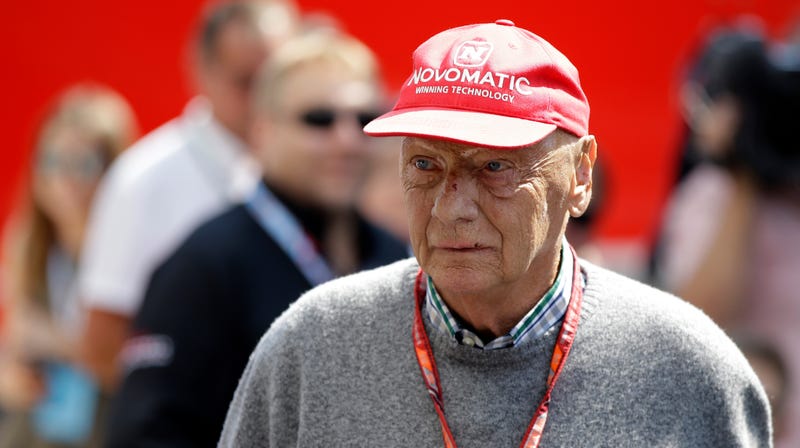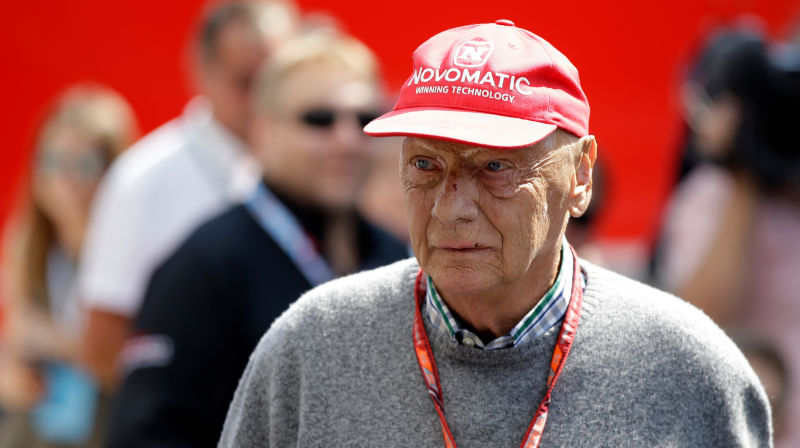
Andreas Nikolaus “Niki” Lauda, a legendary figure of perseverance in the face of adversity and three-time Formula One world champion who remained a fixture in the sport even after his racing days were long over, has died, according to multiple news reports. He was 70.
Lauda stared down hell itself in a 1976 German Grand Prix crash that left him badly burned and returned to the race car just six weeks later. He was a common sight on the F1 grid even in recent years, serving as Non-Executive Chairman of Mercedes-Benz’s F1 team, and an inspiration to those who came after him.
Lauda passed away Monday after undergoing kidney dialysis, his family said.
“With deep sadness, we announce that our beloved Niki has peacefully passed away with his family on Monday,” the family said in a statement, according to the Austrian press agency as quoted by The Guardian.

Advertisement
Lauda was born Feb. 22, 1949, according to the McLaren website, to a wealthy family in the Austrian banking business. But his family didn’t approve of him racing, and when Lauda got a sponsorship from an Austrian bank, CNN reports that his grandfather stepped in to stop the deal.
Lauda’s grandfather was on the board of the bank, so that easily succeeded.
“He said, ‘No way. If this is my grandson, you will not sponsor him,’” CNN quoted Lauda as saying in 2013. “I really got upset with him and said, ‘Leave me alone, it is my own business.’ Then I started racing my own way.”
Advertisement
Lauda’s “own way” of racing was by taking out loans to become a pay driver in an expensive sport, at least in the beginning. Lauda took out loans in the early 1970s, including one for $30,000, according to McLaren, to buy his way in.
Lauda made his debut at 22 for the March F1 team at the Austrian Grand Prix in 1971, before buying into a full 1972 season with more loans. March had a terrible 1972 season, with the Racing Reference database listing Lauda at an average finish of 15.3 with car counts in the mid 20s each race. Racing Reference lists Lauda’s finishes in four of the 12 races in 1972 as the result of car issues or disqualifications, and Lauda isn’t listed as finishing on the lead lap once that year.
All in all, the McLaren website said Lauda “finished the miserable season clean out of his sponsorship” and “seemingly left high and dry and with no obvious prospects of continuing.”
Advertisement
But Lauda did continue, with CNN reporting that his loan-financed career began to pay off at the end 1973. That’s when Lauda was signed by Ferrari, where he would win his first two F1 titles and suffer a crash that almost killed him.
Lauda, in his usual unapologetic manner, started the deal off in the only way he knew how. From CNN:
“I remember my first test in Fiorano,” [Lauda] recalls. “I drove the first couple of laps and (team founder) Enzo Ferrari was there and Piero his son to translate.
“Ferrari said, ‘So kid what do you think of this car?’
“I said the car was s**t. And Piero said, ‘You cannot say this. You cannot tell my father that the car is s**t because he will throw you out. Tell him it’s no good, it sounds a little better.’
“He told him and the old man really got upset because I criticized a Ferrari.”
In talking about it during a 2013 interview with CNN, Lauda still called Ferrari founder Enzo Ferrari an “old man.” Lauda was 64 at the time.
Advertisement
Lauda’s career took off with Ferrari, and so did his win count. His first of 25 career wins, according to McLaren, came in 1974 with Ferrari. He won two of the 15 races that year, before winning five of the 14 races in 1975 to get his first F1 championship title.
The 1976 season was going just as well, until the German Grand Prix in August.

Advertisement
To those outside of the racing circles, Lauda was perhaps most famous for the aftermath of that German Grand Prix—the race that almost ended his life the year after his first title. It was August of 1976 at the Nürburgring, and Lauda was 27 years old. A hard crash left him trapped in his burning vehicle for more than a minute, severely burning his body and damaging his lungs.
Lauda had safety concerns about the race and tried to get drivers to boycott it, but there weren’t enough votes in his favor. They raced. Lauda crashed at high speed during the race and bounced into traffic, his car bursting into flames with him trapped inside. He was in critical condition after the wreck, with his hands, scalp, forehead and ears severely burned.
Lauda underwent operation after operation for the burns, to replace his eyelids, and to remove smoke and debris from his face and lungs. He returned to racing just six weeks later, wearing bloody bandages over the burns on his face and a special helmet, and fighting tear-duct damage that impacted his vision.
Advertisement

In typical Lauda style, the “astonished doctors said he had recovered by sheer force of will” in such a short amount of time, according to the F1 website.
In his first race back that year, the Italian Grand Prix, Lauda finished fourth. There were three races left in the season, and despite missing three after his wreck, Lauda was in a close battle with his noted rival James Hunt for the championship title.
Advertisement
It was raining heavily when F1 arrived in Japan for its season finale that year, to the point that Lauda and others didn’t feel safe racing.
Pressure from television rights made the race go forward, and Lauda said he’d do one lap before quitting because it wasn’t worth it to race in those conditions. He lost the championship to Hunt that year by one point, but didn’t even stay around to see the end of the race—or if he’d won the title.
Here’s how Lauda told the story, from the Guardian:
“I was spokesman for the drivers then, and I stood up and said: ‘Are you guys fucking crazy? The rain has not stopped. It’s got worse. You cannot do this.’ But the guy insisted. For me it was ridiculous. Because of a stupid TV deal we had to go out there and risk our lives. No one could see anything. It was a disaster.
“So then I decided for myself that television was not a good enough reason for me to race. So I told Ferrari beforehand I would do one lap, which I did, and then I stopped. I have no regrets. I would do the same again. But I have to say that without my accident, maybe, I would have had the reserves to do it.” […]
“I went to the airport. I told this Japanese taxi driver to listen to the radio and tell me who had won the title. And exactly when the end of the race came on the radio he drove through the tunnel of the airport and the radio stopped. And when we came out, it was over. Who won? I asked. ‘I don’t know,’ he said. But then, as we came up the ramp to the airport, there was a Ferrari man who wanted to say goodbye. And I looked at his face and I knew straight away. ‘Fuck,’ I thought. And he said, yes, Hunt was world champion. So I went home.”
Advertisement
The horrific crash and Lauda’s dedication to get back onto the track as quickly as humanly possible—in an almost superhuman way—was later immortalized in books, films and the movie Rush.
The next year in 1977, Lauda clinched his second-career championship 14 races into the 16-race schedule. His relationship with Ferrari management had gone downhill and Lauda decided to skip the last two races of the season because he’d already won the title, according to F1. At the time, Lauda told Ferrari he was leaving for eventual F1 CEO Bernie Ecclestone’s Brabham team. F1 quotes Enzo Ferrari as calling him a traitor for it.
More than just relationships with management started to go downhill for Lauda at Brabham. From the F1 website:
In his 1978 season with Brabham Niki won twice and finished fourth in the championship. The next year, in an uncompetitive car, he had scored only four points prior to the penultimate race, in Canada. There, after the first practice session, he walked away from Formula One racing, saying he was “tired of driving around in circles” and would now start his own airline.
Advertisement
That was Lauda’s first departure from F1 after the 1979 race season. Lauda came back in 1982 when the F1 website said he needed more money for the airline and McLaren persuaded him out of retirement, winning his third race back in the sport in Long Beach, California.
His personality hadn’t changed much while he was gone. From F1:
In 1982 he signed with McLaren for a reported US$5 million, the most lucrative contract in Formula One history. In his negotiations Niki told the McLaren money men he was only charging one dollar for his services as a driver – all the rest was for his personality.
Advertisement
Lauda went on to win the 1984 F1 title and retired in 1985, just three races after his final win in the sport in the Netherlands. At the end of it all, he’d been in the sport for 13 seasons, competed in more than 170 races and won 25 times.
But Lauda didn’t leave F1 when he retired as a driver. He worked as a Ferrari F1 advisor, a Jaguar F1 team principal and a TV commentator before becoming a non-executive chairperson for Mercedes before the 2013 season, according to F1. Lauda was said to have been a big factor in convincing Lewis Hamilton to join Mercedes for 2013, where Hamilton has won four championships since.
When asked in 2013 if he was ever emotional when going to the grands prix at the Italian track in Monza where he made his 1976 return—and where he could barely drive the car when he first got in—Lauda told Reuters he wasn’t.
Advertisement
“No,” Lauda said. “I’ve been here so many times, it’s finished. I live today and think of tomorrow.”
This is a breaking news post and is being updated.













